
The runner-up, former South Bend mayor Pete Buttigieg, is a line-cutter just like the last Democratic president, Barack Obama — perfectly comfortable with establishment power, just not willing to wait his turn and indifferent to those who say he’s promising but needs more experience.
Now both these men — with their gaping generational and ideological divides — are moving forward in a Democratic contest whose still-muddled status out of New Hampshire has virtually guaranteed a confrontation with billionaire Michael Bloomberg and has given a shot of life for the previously marginal candidacy of Sen. Amy Klobuchar.
The former New York mayor’s unorthodox strategy, skipping the early states and blasting his way into the race with hundreds of millions of dollars in advertising, gives him elements of both line-cutter and gate-crasher. At a minimum, his $50-billion-plus fortune, combined with zero restraint about spending it, allows him to not care much about whatever old rules he is bending or breaking.
This leaves Klobuchar — newly ascendant just as Sen. Elizabeth Warren and former vice president Joe Biden are losing altitude with two weak performances in a row — as the only conventional candidate to emerge from New Hampshire with enhanced momentum. Neither gate-crasher nor line-cutter, she is the student who didn’t necessarily dazzle with charisma but turned her homework in on time and asked the teacher if she could have some more for extra credit.
This could be an enviable position for a female candidate with a moderate record and impressive resume, given that the Democratic field is otherwise crowded at the top with three people claiming to be this election cycle’s disruptive agent — all men who scarcely conceal their self-regard.
Speaking of conventional thinking, the standard logic of Democratic operatives would find plenty to fret about Tuesday night. Typically, the earlier a nomination battle wraps up, the better it is for general-election prospects. New Hampshire, if not a deciding force, is historically a clarifying one in a way that does not look to be the case this time. For at least the next month, this promises to be an unsettled race with exposed fault lines of ideology, age, gender, and possibly — depending on the dynamics of the South Carolina primary on Feb. 29 — also of race.
A question for the fretters: Has this lately been an age when conventional strategic assumptions prevail, and if so, wouldn’t Hillary Clinton be president? Within limits, conflict and chaos might just be good for political business (no question it is for the media business).
There would seem to be ample kindling for that conflict.
After finishing at or nearly tied for the top in both Iowa and New Hampshire, Sanders can plausibly claim to be in command of the race. It would be a stretch to claim it too loudly.
Yes, it was a crowded field this time in a way that it was not in 2016, when Sanders won by almost 23 percentage points over Clinton, in a way that presaged their long and peevish nominating contest. Even so, his performance was much less jolting this time, and the results do not suggest that he is sweeping the party in an ideological movement with the same force that Trump swept the GOP in 2016 with a cult-of-personality movement.
Sanders’ brand of fighting leftist politics won a narrow plurality in New Hampshire. The more incrementalist, less confrontational politics represented by Buttigieg, Klobuchar and Biden cumulatively won a majority.
What are the arguments ahead?
Among the imponderable is what Biden and Warren are prepared to do to reinvigorate campaigns that now seem on the edge of viability. Warren vowed Tuesday night “our campaign is built for the long haul,” and is now emphasizing assertions that she can unite the party and rout Washington corruption rather than the unabashed progressivism on health care and other issues that shaped her message through much of 2019. Biden is staking everything on the hope that the pivotal African American vote will stick with him in South Carolina.
The approach of others is not yet clear. Bloomberg’s willingness to confront Sanders on socialism and electability isn’t in doubt. But how much will he take a fight to Buttigieg and Klobuchar, given that they are broadly in concert on ideology?
Klobuchar is eager to engage with Buttigieg, for obvious strategic reasons — they are likely in a zero-sum battle for moderates who don’t like Biden’s, Warren’s, or Sanders’ chances in a general election. At least in Klobuchar’s case, the rhetorical thrusts won’t be feigned; in recent debates she has hardly concealed her disdain for what she regards as Buttigieg’s glibness and shallow experience. “My story is like yours, “ she said in her New Hampshire remarks, “one of resilience…..I am not a newcomer with no political record. What I do is get things done.”
As for Bloomberg, while his path to top-tier status and the nomination seems more plausible on Wednesday than it did on Monday, he too is being buffeted by the unexpected. Last November, his senior advisers were briefing reporters that his strategy envisioned Biden not being able to sustain his national lead — OK, could be happening — and then an open-field race against Warren, whom they expected would soar in the early states even though Bloomberg believes she is too liberal to win against Trump.
For Bloomberg, no less than the rest of us, the past few months have been full of surprises — a failure of prediction that promises to make the next few months every bit as exciting.
Source: politico.com
See more here: news365.stream






